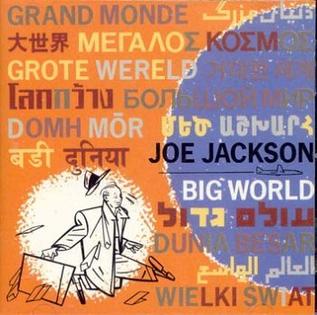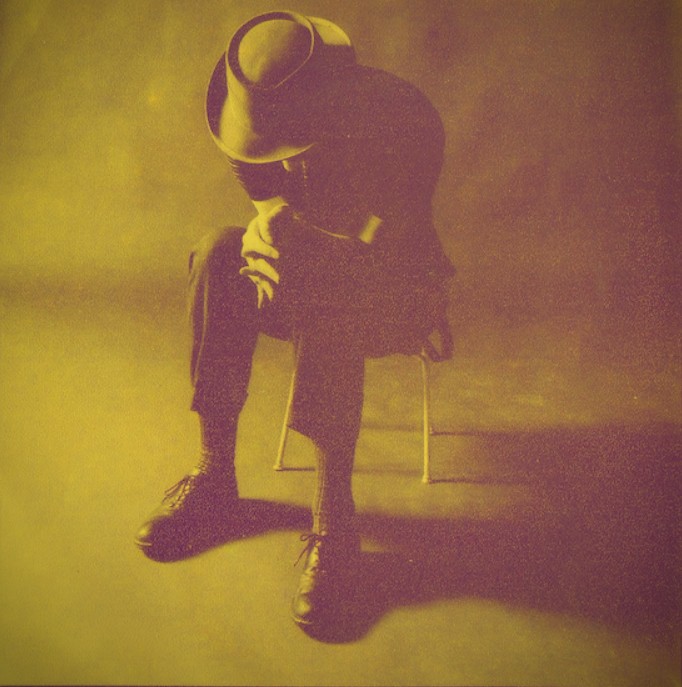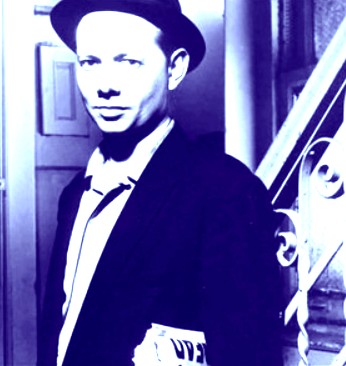
In June 1986, Joe Jackson spoke to a reporter for the Los Angeles Times about his latest record Big World. In the article, Jackson admitted the reason why his albums vary in style was that he didn’t want to get bored. To challenge himself to record a live album with no overdubs, no post-production mixing, and no multi-track recorder, he got his band ready by doing a mini-club tour in the New York and New Jersey area for nine dates. That would allow him to road test the material and make changes as needed. Finally ready for the recording sessions, Jackson booked three nights at the Roundabout Theatre in New York City between January 23rd and the 25th to record the band in front of a live audience. At the time, the press spun a narrative that Jackson forbade the audience from making any noise during the songs. This request (which Jackson says is a myth) allowed many in the music press to run headlines like “Shhhhh! Serious Artist At Work” when the Big World Tour was underway. Jackson said the only request he made was to ask the audience to “hold it until they were sure a song was finished.” He wanted to leave room for the band to be spontaneous while being focused on the intensity of the songs. Recording the album live would allow those moments to flourish without the crowd noise — or so Jackson hoped. If you look at the video footage of the recording sessions, you can clearly see that the audience understood what Jackson was trying to accomplish, and you can also see that people did clap and cheer — but only after it was pretty clear the song was over. It may seem like I’m making a lot of noise about a quibble the press had with the making of Big World, but the big point is that the record is an innovative feat that lesser musicians couldn’t attempt with similar results. It’s not an easy thing to record 60 minutes worth of music in three live sessions — and have it sound as good as it does if the artist and musicians weren’t as accomplished as Jackson and his band.
During the ‘80s, there was a move away from analog tape to digital recordings. The warmth that our ears got used to (and associated with the ‘70s) started to change as the high end was emphasized in the digital recorders of that era. Even though Jackson plays with a full band, the overall recording has a thin quality to it. Sure, it’s a product of its time, but that kind of “clean sound” that became a hallmark of certain digital recordings is very much front and center on Big World. Jackson’s engineering crew was certainly able to live mix the band to bring out the individual instruments and voices in an expert way, but they weren’t able to put a little grime on the sheen of the recording to add depth to low and medium range. This is clear from the outset with “Wild West.” The strumming of the acoustic guitar and the homage to Ennio Moriconne’s score for The Good, The Bad and The Ugly with the use of a recorder to sound like an Ocarina have a kind of shrillness to the recording. But the low end comes in (thankfully) with Gary Burke and Rick Ford on drums and bass guitar. The song itself is about taking chances in the rough and tumble of America’s capitalist economy (“breaking my back for some opportunity”). If the payoff is big, the narrator hopes to take that fortune “home” — because staying the wild west can mean hearing “guns in the night [hoping] they’re not for you.” It’s a dog eat dog, and dog eats master kind of world Jackson see in America — a theme that resurfaces in “Right and Wrong.”
Jackson has never hidden his dislike of right-wing politics and takes aim at Ronald Reagan in that song. Mostly, “Right and Wrong” is about a speech Reagan gave where he emphasized political thought in moral terms — and how that affects the wider culture. Jackson’s punk sneering is there, but so are the pop hooks. The effect of the two elements tend to cloud the political commentary, but perhaps at this stage of his career, Jackson’s fans didn’t need to be clobbered over the head with lyrics that were too on the nose.
Speaking of on the nose, “(It’s a) Big World” is quite literally about traveling around this big world of ours — and having what can be described as adventure travel experiences. Eating shrimp in Hong Kong, consuming psychedelic mushrooms in Bali and feeling “God-like,” eating fresh fish Kyoto, Baklava in Istanbul, smoking hash in Casablanca, it’s a culinary and drug-fueled trip that makes him realize there “plenty of room for me and you.” Well, duh. But I get his point. To break out of the narrow way Reagan’s America describes the world, you gotta embrace cultures that are different from your own. One way to do that is to travel — which, it seems, Jackson has done plenty of.

The album really kicks into high gear with a pair of taut tunes. “Precious Time” and “Tonight and Forever” signal that Jackson isn’t all that interested in the jazz flourishes or the city-centric pop of his previous two records. For both of these songs, having them recorded live was the right thing to do because the energy and intensity of the performance could have easily been lost in the piecemeal fashion of most recording sessions. After the raucousness of “Tonight and Forever,” Jackson brings the tempo waaaay down with four songs that give the audience and musicians a bit of a break. “Shanghai Sky” has a sprawling and epic feel, while “Fifty Dollar Love Affair” channels a French vibe about, what else, hooking up with a gal in a rather seedy setting where sailors and other “tramps and rock ‘n’ rollers” hang out. “We Can’t Live Together” is a kind of throwback to the Body and Soul record in that it has a jazzy flavor with a pretty soulful chorus. “Forty Years” is kind of prescient in observing the fraying bonds between former allies in World War II: “Once allies cried and cheer/But it was forty years ago.”
With “Survival” Jackson is back with his critique of social Darwinism that he saw as rampant in the U.S. It’s not a subtle jab with lyrics like “Life’s a bitch and then you die…So take what you want…for survival.” More culture critiques of the U.S. come in “Soul Kiss” where Jackson sees “students vote for actors” and “all the hippies work for IBM.” And the hits keep coming with “Jet Set” that could be subtitled at The Ugly American: The Yuppie Years. Lest you think that Jackson’s piss and vinegar attitude is directed solely at Americans, along comes “Tango Atlantico” where soldiers, generals, ladies of the night drink and smoke away their bitterness the hollow promise of post-war happiness. “Home Town” and “Man in the Street” end the record on a one-two punch of sorts. “Home Town” is reflective and a bit romantic as Jackson meditates on what makes for “home” in the place where he grew up. Lyrically, “Man in the Street” is back to slaying sacred cows, skewering know-it-alls, and chucking the middle finger at those in power.
Since his debut as an A&M Records artist in 1979, Joe Jackson affected a punk attitude more akin to Elvis Costello than Johnny Rotten. Part of that is because by 1979, punk was no longer in fashion. Rather, a softer New Wave sound was ascending — and was a better match for an accomplished musician like Jackson. But Jackson isn’t so highbrow that he can’t weave a punkish spirit into Big World — and does so in a devilish way that wraps sneering lyrics in well-crafted music. It’s something he’s been doing for decades, and sometimes it works really well. On Big World, it clearly works. The music he creates for these 15 powerhouse songs spans a number of genres, but they are almost always rooted in rock. The record didn’t do all that well in terms of chart activity. It spent 25 weeks on the Billboard Album charts and peaked in May 1986 at #34. Compare that with his 1982 release Night and Day (which peaked at #4 and was on the charts for 57 weeks), and you’ll see a study in contrasts. Billboard charts aren’t everything, but they can indicate how difficult it can be to keep an eclectic artist like Joe Jackson on the radio with new music — especially when the style of his music can change from album to album. In a way, Big World is a sleeper hit of the ‘80s. He was clearly riding a wave of creative output during this decade by recording and releasing nine albums in 10 years. His uncanny ability to take risks in music was not always a hit with the general public. However, in the 33 years since its release, Big World has shown there’s a timeless quality to the album that no other musician in his generation has been able to replicate.

This was a great period for Jackson that was largely lost to people who saw Look Sharp as a one-hit wonder album. He was trying a lot of different things, some of which were polarizing, but few others dared (for the storied fear of “alienating fans”).
Agreed! Soundtracks, instrumental records, jazz flavored records…it was his most creative period. Not sure a record label would give an artist that kind of creative freedom nowadays.
As an owner of every single Joe Jackson album and pretty darn big fan, “Big World” is his masterpiece, for my ears – for many of the reasons highlighted in this article. Jackson was his peak, arguably – had the wind at his back and the material is an concise encapsulation of his songwriting abilities, as his band of the time. It’s a complete and consistent album of top-shelf songsmanship. I go back to it, without fail, at least once a year and always marvel.
It’s a shame Big World didn’t catch on with the record-buying public the way his earlier records did. The record has so many strong songs that it kind of got buried in the number of albums Jackson released in the ’80s.
I was at the last of the sessions at The Roundabout. The audience was asked to hold applause, as you mention, until Joe gave a nod to say it was okay to make noise. And, to keep things loose, the band would play an older tune now and then so we could get our ya-ya’s out. So much great music was played that night.
One of his best indeed.
I missed that tour, but a friend of mine saw Jackson play The Greek Theater in Berkeley, CA during the North American leg, and she said they were recording that show as well. He did ask the audience to keep quiet until a song was completely over. After they finished the session with the new songs, she said he came out all loose and happy and played a bunch of older songs as a kind of “second set.” The only live version I’ve seen of the Big World Tour is a LaserDisc that was recorded in Japan.